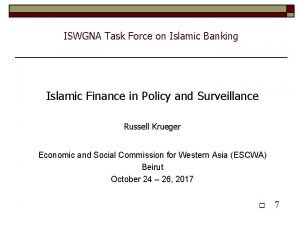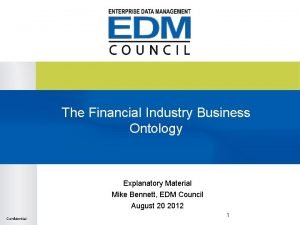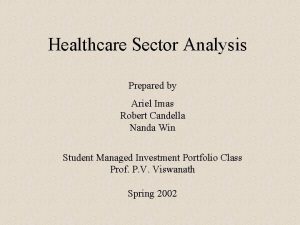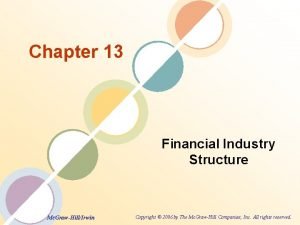GCSE Economics Financial Services Industry Definition The Financial

















- Slides: 17

GCSE Economics Financial Services Industry

Definition • The Financial Services Industry is a term describing all organisations which operate collectively in the industry providing a range of financial services to consumers. Images © thinkstockphotos. co. uk

Contribution of the Financial Services Industry to the UK economy • Traditionally, the UK has been a net ‘exporter’ of financial goods/services, resulting in a net surplus on the Balance of Payments (of invisibles) in the UK economy.

Financial Services Industry • http: //www. telegraph. co. uk/finance/newsbysector/banksandfinance/1130 6744/Financial-services-employee-numbers-at-highest-level-since-crisishit. html • London known as a key global financial centre – No. 1 in the world • Many financial services providers have ‘back offices’ or financial centres in various regions of the UK, e. g. Northern Ireland (Newry, Belfast), Scotland (Edinburgh) and England (Manchester, Birmingham, Leeds).

Definition of Market failure When the price mechanism results in an inefficient or unfair allocation of resources. • Moral Hazard – occurs where a risk taker takes more risks than expected, knowing that they will be covered by insurance or government • Examples: excessive borrowing by individuals. This leads to insolvency, bad debts, loss of capital by banks Images © thinkstockphotos. co. uk

Financial Services Industry • Asymmetric Information – one party to a transaction has more knowledge than the other, typically a lender will have more knowledge about loans than a consumer • Effects: mis-selling may occur where a lender may sell other financial products related to loan, e. g. PPI or endowments (on a mortgage); thus consumers pay more than they should; A seller makes additional profits

Speculation • Prices of shares/securities are determined by the free market; this might put prices of goods (e. g. shares or houses/property) beyond the reach of low income consumers. For example, the average price of a 2 bedroom house in London might currently be £ 300, 000 compared to £ 250, 000 one year ago – the price rise might be due to speculation; whereas average consumer income in that region may only be £ 50 -60, 000, which might create a situation of market failure – leading to over-supply in the housing market regionally. A seller makes additional profits.

Monopoly • Monopoly – limited competition in the financial markets (banking sector in particular) where services are provided by a small number of banks who control the availability and pricing; e. g. lack of incentive for consumers to switch accounts between banks – many accounts provide similar facilities (e. g. overdraft, debit cards) and bank charges/fees are similar • Effects - consumers could pay excessive prices due to the lack of competition between providers, since bank charges are levied at similar rates and for similar services; a seller makes additional profits

Incomplete Market • Incomplete Market – a situation where only a part of the total demand has been satisfied in the market – e. g. not all consumers have a bank account in the UK. • Effects – around 1½ million individuals have no access to a bank account in the UK and are excluded from the market; a seller can lose out on market share

Regulation of the Financial Services Industry in the UK In the UK, the Financial Services Act (2012) states that the responsibility for regulation of the Financial Services Industry is shared between: • Financial Conduct Authority (FCA) • Prudential Regulation Authority (PRA)

Financial Conduct Authority • The FCA is responsible for ensuring that the financial markets work well so that consumers get a fair deal. • The FCA supervises financial services providers to ensure that they operate with integrity, provide financial products/services that are appropriate for consumers, and that such financial services providers conduct their business operations in the best interests of consumers.

Prudential Regulation Authority (PRA) • The PRA is responsible for reviewing the activities of financial services providers in the UK, and ensuring the stable operation of financial services providers in the UK, such that it avoids any widespread disruption to the operation of financial services industry and minimises any impact on consumers

Financial Ombudsman Service • The Financial Ombudsman aims to assist in the resolution of disputes between consumers and financial services providers in a way that is fair, quick, reasonable and informal

Financial Services Compensation Scheme (FSCS) • This is a scheme established for the purpose of providing financial compensation to individuals who suffer loss as a result of financial difficulties experienced by a financial services provider (e. g. bankruptcy, financial loss etc. ). • All savers in the UK have their savings guaranteed up to an amount of £ 85 000, such that, if the bank/credit union/financial services provider goes bankrupt, then they will get their money back

Questions 1. Explain what is meant by the term ‘Financial Services Industry’. 2. Explain the term ‘financial services provider’, using 3 different examples to support your answer. 3. Explain three ways in which the Financial Services Industry contributes to the UK Economy – support your answer with data covering the period 2010 to the present day. Images © thinkstockphotos. co. uk

Classroom/Group Activities Prepare a short presentation to: 1. Explain the 4 functions of the Financial Conduct Authority in the UK. 2. Explain how the interests of consumers are protected in the Financial Services Industry: • Financial Services Ombudsman • Financial Services Compensation Scheme (You could use the internet to research the answers and you could use recent cases published in the media). 3. State 3 reasons why the financial crisis occurred in 2008. 4. Discuss 4 examples of how market failure could apply to financial services industry in the UK.

Financial Services Industry • Notes:
 Psifis
Psifis Maastricht university economics and business economics
Maastricht university economics and business economics Non mathematical economics
Non mathematical economics Financial services modernization act of 1999 definition
Financial services modernization act of 1999 definition Intertek romania
Intertek romania Managed services in hospitality industry
Managed services in hospitality industry Fefe curriculum
Fefe curriculum Fefe lesson plans
Fefe lesson plans Fefe curriculum
Fefe curriculum Financial industry business ontology
Financial industry business ontology Fibo financial ontology
Fibo financial ontology Healthcare industry financial ratios
Healthcare industry financial ratios Financial industry structure
Financial industry structure 2amd15
2amd15 Financial industry business data model
Financial industry business data model Hình ảnh bộ gõ cơ thể búng tay
Hình ảnh bộ gõ cơ thể búng tay Frameset trong html5
Frameset trong html5 Bổ thể
Bổ thể
































